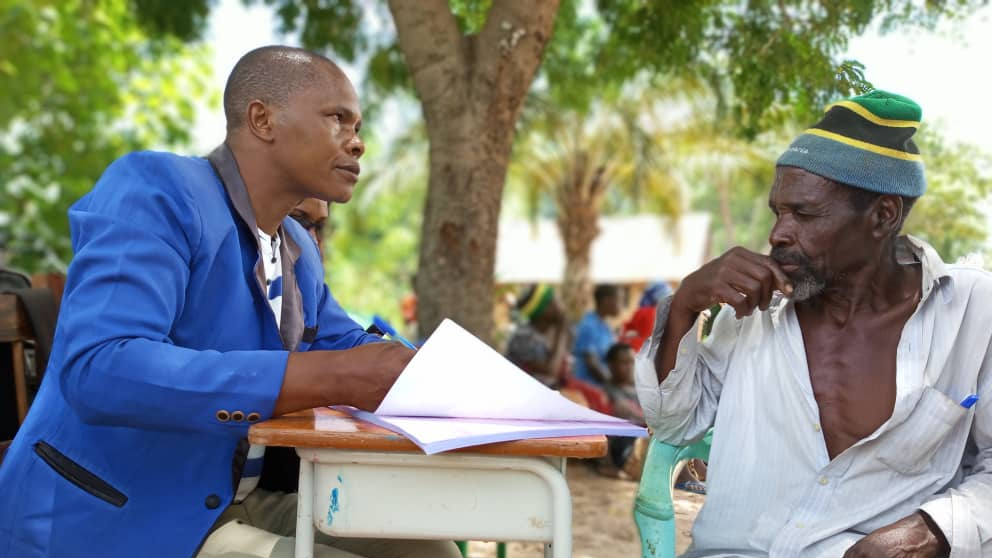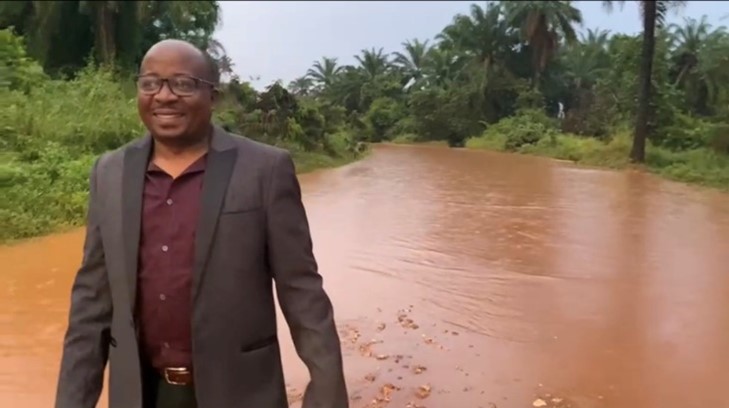CDC and Tanzania Speed Up COVID-19 Vaccinations
Summary
- More than 1,000 COVID-19 vaccination stations were created in HIV clinics to reach people living with HIV (PLHIV), other people seeking medical care, and healthcare workers.
- More than 1,000 people were trained to safely administer vaccines.
- With CDC’s ongoing support, nearly 9.2 million people in Tanzania received their primary COVID-19 vaccinations between October 2021 and September 22, 2022.

A health worker at a community health clinic in Tanzania tells a man about the benefits of getting vaccinated against COVID-19. This CDC-supported HIV/TB clinic - in Tanzania’s Tabora Region - also offers COVID-19 vaccines to clients. Photo by Wasiwasi Kilave/ Management and Development for Health
Since the first COVID-19 case in Tanzania was reported in March 2020, the U.S. Centers for Disease Control and Prevention (CDC) country office worked closely with the Government of Tanzania to control the spread of the disease.
In June 2021, Tanzania joined COVAX, a global partnership dedicated to establishing fair and equal access to COVID-19 vaccines for every country in the world. The first 1 million COVID-19 vaccine doses – donated by the U. S. government and delivered by COVAX – arrived in Tanzania on July 24, 2021.
Four days later, Tanzania’s President Samia Suluhu Hassan got her first dose of COVID-19 vaccine, kicking off the country’s first vaccination campaign.
CDC-Supported HIV/TB Clinics Offer Access to COVID-19 Vaccines
Public demand for COVID-19 vaccines in Tanzania started off strong.
By September 2021, interest began to drop. The Government of Tanzania decided that Tanzanians ages 18 and older were eligible to get the vaccine. Tanzania’s Ministry of Health asked U.S. CDC and partners to work together and create programs to encourage more people to get vaccinated.
Through the U.S. President’s Emergency Plan for AIDS Relief (PEPFAR), CDC provides HIV and TB treatment services in 11 districts on Tanzania’s mainland and the island of Zanzibar. This part of Tanzania includes more than 50% of the population the government planned to vaccinate. CDC Tanzania launched a new and intense six-week COVID-19 vaccination campaign.
“We used our network of PEPFAR-supported HIV treatment facilities and local partners to offer COVID-19 vaccines to clients receiving HIV medicine, called antiretroviral therapy, during their already scheduled appointments,” says CDC Tanzania Country Director, Mahesh Swaminathan, MD.
Ten CDC staff members were assigned to support Tanzania’s nationwide vaccination efforts. This work included the development and implementation of the National Vaccine Deployment Plan.
Seventeen staff members traveled to the 11 regions plus Zanzibar to provide oversight and support during the vaccination surge.
Swaminathan says the team tracked progress over time. “We monitored vaccinations at more than 500 sites on a weekly basis, which allowed us to see what was working, what wasn’t working, and what could be improved.”
CDC staff learned:
- Healthcare workers and the general public often hesitated to get the vaccine even though COVID-19 vaccines are safe and effective.
- Some people feared vaccines would affect their ability to have children, even though there’s currently no evidence that COVID-19 vaccines cause fertility problems.
- Some believed certain groups like pregnant people should not get the vaccine, even though they are a high priority for COVID-19 protection through vaccination.
- People did not know where to get vaccinated.
“Sometimes addressing the barrier to vaccination was as simple as having a sign that says ‘COVID-19 vaccines here,’ ” Swaminathan explained.
CDC focused on vaccinating people at highest risk for getting sick due to COVID-19, including people with HIV, staff in healthcare facilities, and community workers.
CDC’s staff and partners also supported regional government leaders by conducting routine education at HIV clinics and providing technical assistance around vaccine distribution planning.
Through these efforts, more than 40% of people with HIV and 80-90% of CDC-supported partner staff, community, and health facility workers got at least one dose of COVID-19 vaccine during the six-week surge campaign.
“Without additional funding beyond our existing resources, we were able to fully vaccinate about 315,000 people during this six-week vaccination campaign,” says Swaminathan.
We brought vaccines to people who couldn’t get to them.
COVID-19 Vaccination Campaign in Tanzania Goes from Sprint to Marathon
After six weeks of fast-moving vaccination efforts and with more vaccines arriving in country, CDC’s Tanzania office focused on long-range vaccination plans.
In February 2022, CDC Tanzania expanded its support for COVID-19 vaccination after receiving additional resources from the U.S. government through the American Rescue Plan Act (ARPA).
“With the addition of ARPA funds, we were able to vaccinate more than 500,000 people in one month, and continued to see a rise in vaccination,” said Wangeci Gatei, MD, CDC Tanzania’s division of global health protection program director in Tanzania.
By June 2022, Tanzania was one of 11 countries selected to get more support from the U.S. government’s Initiative for Global Vaccine Access (Global VAX) program. The additional funding allowed CDC to provide more technical assistance and service delivery to increase vaccination efforts in Tanzania.
At the same time, Tanzania’s government announced its goal to fully vaccinate 34 million people on the mainland (70% of its population), and 900,000 people on Zanzibar (47% of its population) by December 2022.

CDC’s Deputy Laboratory Branch Chief in Tanzania and Regional Lead for the Kigoma region, Mushubira Balinda, MD, crosses a road that flooded during Tanzania’s rainy season. He is walking to a remote CDC-supported HIV/TB treatment center in Kigoma, Tanzania, where patients can also get COVID-19 vaccinations. Photo by Appolinary Bukuku/THPS
More than 9.2 Million (and counting) Tanzanians Vaccinated with CDC Support
With the additional Global VAX support, CDC and partners launched a broad vaccination campaign in Dar es Salaam and other regions, including hard-to-reach remote areas around Tanzania’s lake zones. Outreach efforts included:
- Religious leaders were asked if CDC and partners could offer COVID-19 vaccinations at their mosques and churches on the weekends.
- Health officials encouraged universities and businesses to support COVID-19 vaccinations during the week.
- Small mobile vaccination teams went door-to-door to vaccinate more people.
CDC staff sometimes traveled 200 miles each way to make sure COVID-19 vaccines were available to people in remote areas. They set up temporary vaccination sites with partners already engaged in HIV prevention work through PEPFAR. The sites provide COVID-19 vaccinations along with other health services like blood pressure screening and reproductive health services.
“We brought vaccines to people who couldn’t get to them,” says Gatei. “The clinics are set up for a week or two, and then they can be taken down and moved to another important area.”
CDC Tanzania’s extensive efforts to reach a larger part of the general population continue to have a big impact. As of August 4, 2022, CDC has worked to ensure that:
- More than 9.2 million people received their primary COVID-19 vaccinations in the 11 CDC-supported regions and Zanzibar.
- More than 1,000 COVID-19 vaccination stations were created in HIV clinics.
- More than 1,000 people were trained to administer vaccines.
- Up to 8,000 health facility and community vaccination sites are supported weekly.
- Worked with 296 religious and community leaders and 9,791 community members in COVID-19 advocacy meetings.
With CDC Tanzania’s support, nearly half of the eligible population received the primary series of COVID-19 vaccines, as of September 26, 2022.
This success motivates CDC and partners to further increase COVID-19 vaccination efforts throughout Tanzania. The goal is to have 70% of the eligible population receive primary COVID-19 vaccinations by the end of this year.

U.S. CDC’s Oscar Rwabiyago, MD, observes a healthcare worker as she performs all the services offered at this mobile health clinic. U.S. CDC in Tanzania and HIV-prevention partners set up a temporary clinic in the Ilemela District of the Mwanza Region. It provided access to COVID-19 vaccines and other healthcare services including HIV testing and counseling. Photo by Kokuhabwa Mukurasi/CDC Tanzania.